|
|
|
Sort Order |
|
|
|
Items / Page
|
|
|
|
|
|
|
| Srl | Item |
| 1 |
ID:
087479
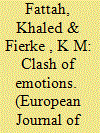

|
|
|
|
|
| Publication |
2009.
|
| Summary/Abstract |
After the attacks of 9/11 Americans asked, `Why do they hate us so much?' The answer has been framed in terms of a range of `clashes', none of which has addressed emotion, which is at the centre of the question. Emotion, and particularly humiliation, has begun to be addressed within the literature of IR. Numerous scholars have highlighted the pervasiveness of a discourse of humiliation in the Middle East and its relationship to the swelling ranks of recruits who are willing to act as human bombs. The purpose of this article is to examine the emotional dynamics of this relationship. The first section undertakes a conceptual analysis of humiliation and betrayal. The second section explores how these emotions have been given coherent meaning in the narrative of Islamists from the region. This is followed by an historical analysis of how this narrative has provided a framework for giving meaning to a range of national, regional and international interactions, particularly since 1967, and has contributed to the emergence of Islam as the basis for transnational identity in what had become a highly secular region. Section three examines flaws in the logic of both militant Islamists and the US-led `War on Terrorism', arguing that both have exacerbated feelings of humiliation in the region rather than contributing to a restoration of dignity. The conclusion builds on the principle of human dignity to rethink the international approach to political violence.
|
|
|
|
|
|
|
|
|
|
|
|
|
|
|
|
| 2 |
ID:
154393
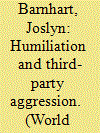

|
|
|
|
|
| Summary/Abstract |
There is a growing consensus that status concerns drive state behavior. Although recent attention has been paid to when states are most likely to act on behalf of status concerns, very little is known about which actions states are most likely to engage in when their status is threatened. This article focuses on the effect of publicly humiliating international events as sources of status threat. Such events call into question a state's image in the eyes of others, thereby increasing the likelihood that the state will engage in reassertions of its status. The article presents a theory of status reassertion that outlines which states will be most likely to respond, as well as when and how they will be most likely to do so. The author argues that because high-status states have the most to lose from repeated humiliation, they will be relatively risk averse when reasserting their status. In contrast to prior work arguing that humiliation drives a need for revenge, the author demonstrates that great powers only rarely engage in direct revenge. Rather, they pursue the less risky option of projecting power abroad against weaker states to convey their intentions of remaining a great power. The validity of this theory is tested using an expanded and recoded data set of territorial change from 1816 to 2000. Great powers that have experienced a humiliating, involuntary territorial loss are more likely to attempt aggressive territorial gains in the future and, in particular, against third-party states.
|
|
|
|
|
|
|
|
|
|
|
|
|
|
|
|
| 3 |
ID:
074176
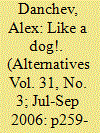

|
|
|
|
|
| Publication |
2006.
|
| Summary/Abstract |
An examination of the disturbing practice of torture and abuse in the "global war on terror," focusing on the methods and motivations of the United States. Proceeding from the imaginary yet all-too-real world of Kafka and the Kafkaesque, it highlights the themes of humiliation and shame in the waging of this war, noting that the damage so caused is reciprocal and indivisible: "Whoever degrades another degrades me."
|
|
|
|
|
|
|
|
|
|
|
|
|
|
|
|
| 4 |
ID:
161100
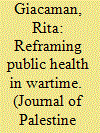

|
|
|
|
|
| Summary/Abstract |
This article traces the research trajectory of the Institute of Community and Public Health (ICPH) at Birzeit University, whose work focuses on life and health outcomes for Palestinians living in chronic warlike conditions under Israeli settler-colonial rule. Over decades of field-based work, ICPH researchers came to the realization that medicalized responses to trauma contributed to concealing the social and political meaning that Palestinians attribute to their collective experience. By adopting an approach that linked the biological/biomedical sphere to the political sphere through the concept of suffering, and exposing the sociopolitical conditions of life and the collective trauma inducing nature of Israeli military occupation and repression, ICPH's research has allowed for the simultaneous personalization of war and politicization of health. In addition to discussing some of the health problems identified by ongoing investigations, the article also touches on the ways in which institution building and research production are linked to the capacity of Palestinians to endure and resist violation in their struggle for justice.
|
|
|
|
|
|
|
|
|
|
|
|
|
|
|
|
| 5 |
ID:
085120
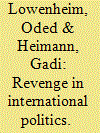

|
|
|
|
|
| Publication |
2008.
|
| Summary/Abstract |
This paper conceptualizes the phenomenon of revenge in international politics and seeks to specify the conditions that increase or diminish the tendency of states to take revenge against enemies. We situate the discussion of revenge within the broader context of emotions in IR. We argue that whether or not a state will take revenge depends on the combinations of three interrelated and mutually constitutive variables: (1) the degree to which a state emotionally experiences harm against it as morally outrageous, (2) the extent of humiliation the harmed state feels, and (3) the degree to which international retaliation is institutionalized by rules and laws that govern the use of cross-border force. We examine the Second Lebanon War (July 2006) as a case of revenge in international politics.
|
|
|
|
|
|
|
|
|
|
|
|
|
|
|
|
| 6 |
ID:
110835


|
|
|
|
|
| Publication |
2012.
|
| Summary/Abstract |
Since the beginning of the 1990s, there has been growing academic interest in the speech act of apology. Both the nature of apologetic communicative processes and the potential of apologies to promote reconciliation remain, however, under debate. The aim of this article is to map common types of rituals found in what is termed 'the age of apology', to identify the processual and structural characteristics of these rituals, and to understand their contribution to restoring relations in the global arena. The analysis yields three types of rituals of apology: purification - that is, asymmetrical rituals in which the offender issues an apology in order to purify his or her dismal past but does not necessarily need the approval of an offended party; humiliation - that is, asymmetrical rituals in which the offended party forces the offender to participate in a degradation ritual as a condition for closure; and settlement - that is, symmetrical rituals in which both sides strive to restore relations. The theoretical and practical implications of these rituals are discussed.
|
|
|
|
|
|
|
|
|
|
|
|
|
|
|
|
| 7 |
ID:
192860
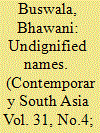

|
|
|
|
|
| Summary/Abstract |
Focusing on the experiences of the marginalised castes in North India, this article examines the use of given names in intercommunity micro interactions and how it shapes the practices of everyday humiliation. With ethnographic data from Dalit activist discourses as well as everyday life in an urbanising village in Rajasthan, this article analyses how the upper castes tend to deform the given names of the members of the Dalit community to produce undignified names, and how the community claims their right to be addressed with appropriate names. I engage with the complexity of the formation and use of undignified names by analysing their function in shaping the local political field to regulate participation in the public sphere and how they are linked to valuable names in the production of social distinctions and their economic benefits. Taking names as an important symbolic object, this article foregrounds the politics of humiliations in everyday intercaste vyavahar to understand the micro dynamics of caste reproduction and how it is negotiated and contested.
|
|
|
|
|
|
|
|
|
|
|
|
|
|
|
|
| 8 |
ID:
092123


|
|
|
|
|
| Publication |
2009.
|
| Summary/Abstract |
Violence is one of the most important causes of suffering and death on the planet. The incidence of different forms of violence varies markedly within and between populations with high rates of violence driven largely by poverty and social injustice and sustained by inept policy responses rooted in legal and moral frameworks. Violence therefore poses a major challenge for public health which is the discipline concerned with assuring the conditions for a healthy society. Over the past five decades it has become increasingly clear that public health has important contributions to make to the challenge of understanding and preventing violence, contributions which extend and complement conventional legal and moral approaches to violence. This work was led initially by the US Centre for Disease Control (CDC) and more recently by the World Health Organisation (WHO) which in 2002 published the first World Report on Violence and Health. Public health is a relatively atheoretical discipline. While a number of useful theoretical frameworks have emerged to better understand and prevent violence, there is no agreed or dominant public health theory of violence. James Gilligan has proposed a detailed and potentially useful public health theory of violence based on the notion that shame/humiliation, which violates an individual's self-respect and dignity, is the pathogen that causes violence; a pathogen intimately linked with cruelty and neglect in childhood, spread by the vector of inequalities in power, wealth and status in society and sustained by punishment and humiliation within the criminal justice system. This notion of violence resonates with Vittorio Bufacchi's concept of violence as a violation of integrity.
|
|
|
|
|
|
|
|
|
|
|
|
|
|
|
|
| 9 |
ID:
073685
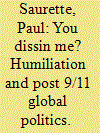

|
|
|
|
|
| Publication |
2006.
|
| Summary/Abstract |
Despite a growing awareness about the importance of emotions to global politics, the discipline of International Relations is still working towards adequate theorisations and investigations of their role. This is particularly noticeable in the fact that there has been little sustained, scholarly examination of the effects of various emotions on the shape and orientation of the US foreign policy reaction to 9/11. This essay seeks to begin to address both of these gaps by examining the role that dynamics of humiliation and counter-humiliation have played in contemporary global politics. In particular, it develops a theoretical understanding of humiliation and then applies this framework to explain how dynamics of humiliation have impacted post 9/11 American global policy. It concludes that we cannot fully understand the sources, and the effects, of post 9/11 contemporary politics (especially US global policy) without taking into account the dynamics of humiliation.
|
|
|
|
|
|
|
|
|
|
|
|
|
|
|
|
|
|
|
|
|